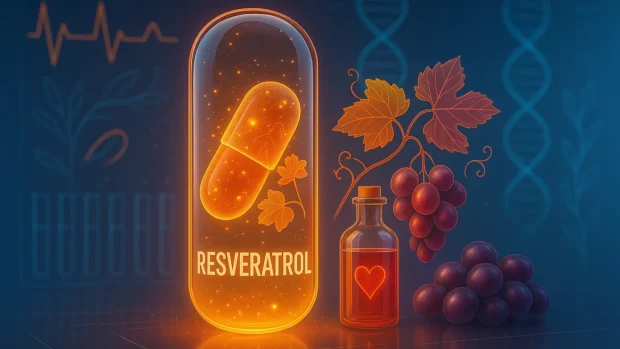
Discover the science behind resveratrol and its potential to slow aging. Learn about its benefits, dosage for longevity, heart health effects, and food vs. supplement sources.
Estimated Reading Time: 5 minutes
Resveratrol is a natural compound called a polyphenol that plants produce when under stress or attack from pathogens. It acts as part of their defense system, essentially functioning as the plant’s immune response.
You can find resveratrol in various foods, including:
The compound first caught researchers’ attention in the 1990s during studies of the French Paradox, leading to decades of scientific investigation into its potential health benefits.
The answer involves multiple mechanisms through which resveratrol may influence the aging process:
Resveratrol acts as a powerful antioxidant, neutralizing harmful free radicals that can damage cells and accelerate aging. It helps protect cellular structures, including DNA, from oxidative damage. For more details, see the study on resveratrol’s antioxidant properties.
One of resveratrol’s most exciting properties is its ability to activate proteins called sirtuins, particularly SIRT1. These proteins are often called “longevity genes” because they’re associated with increased lifespan in various organisms. Learn more in this resveratrol aging longevity review.
Research shows resveratrol can enhance mitochondrial function, improving cellular energy production and potentially slowing age-related decline. Refer to the study on mitochondrial health and resveratrol for more information.
Chronic inflammation is a major contributor to aging. Resveratrol helps reduce inflammation throughout the body, potentially slowing various aspects of the aging process. This is detailed in the article on living longer with resveratrol.
Research in mice has shown promising results, particularly in animals on high-fat diets. These studies demonstrated improved health markers and increased lifespan with high resveratrol doses. Read the animal study on resveratrol and longevity for more details.
Human research has shown mixed but encouraging results:
More information can be found in this article on resveratrol and longevity.
Finding the right dosage is crucial for potential anti-aging benefits:
Important: Always consult healthcare providers before starting supplementation, as resveratrol can interact with certain medications. For dosage recommendations, see this article on resveratrol dosage for anti-aging.
Cardiovascular benefits are among the most well-documented effects of resveratrol:
These heart-health benefits may contribute significantly to longevity, as cardiovascular disease remains a leading cause of death worldwide. Refer to the study on resveratrol and heart health for more details.
Benefits of Food Sources:
Benefits of Supplements:
Note: Supplement absorption can be lower than food sources, so higher doses may be needed. For more information, see the study on resveratrol bioavailability.
Practical Tips:
Enhancement Strategies:
Watch for These Signs of Success:
Does resveratrol slow aging? While it shows promising potential, particularly in animal studies and certain aspects of human health, we can’t definitively say it directly slows aging in humans. However, the evidence suggests it supports several biological processes that contribute to healthy aging.
The compound appears most effective when used as part of a comprehensive approach to health, including:
Remember: While resveratrol shows promise, it’s not a miracle anti-aging solution. Consider it one tool in your healthy aging toolkit, and always consult healthcare providers before starting supplementation.
Resveratrol is generally considered safe up to doses of 1g daily. However, it’s important to consult with a healthcare provider before starting supplementation, as it can interact with certain medications.
Red wine contains resveratrol, but in small amounts (1-2mg per glass), which is much less than the doses used in clinical studies. Supplements may be necessary to achieve higher doses.
Resveratrol is usually well-tolerated, but high doses may cause digestive issues or interact with blood thinners. Always consult your doctor before starting supplementation.